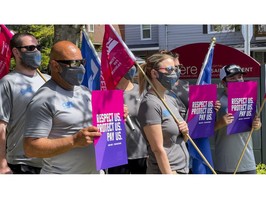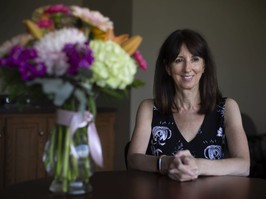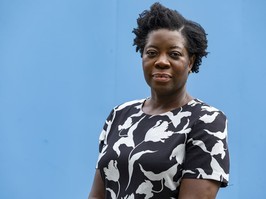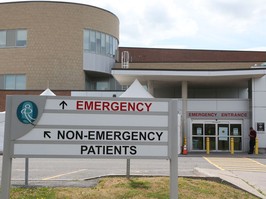healthcare workers taking magic mushrooms for training purposes
therapsil believes that in order for healthcare professionals to deliver this ‘unique therapeutic modality’ it’s essential that they undergo their own psilocybin journeys and guide their peers through the psilocybin therapy process.

natasha fearnley is the first registered nurse in canada to undergo legal, experiential psilocybin-assisted therapy for training purposes.
therapsil
this story first appeared in weekend dispensary, a weekly newsletter from the growthop. signup now to get a story delivered to your inbox every saturday. in its most rigid form, the “medical model,” a form of understanding health, views the body as a machine to be fixed and repaired. it emerged as the dominant view of health in north america in the 20th century.but by the 1970s, criticism about the model and its narrow view began to fester. the model does not account for the “social, psychological, and behavioural dimensions of illness,” as one rebuke published in a 1977 issue of science put it.and while other models have emerged, like the “biopsychosocial model,” which takes a more holistic approach, the traditional medical model remains widespread and pervasive.for natasha fearnley, this was a constant irritation while she was in nursing school.“i always was frustrated by this model of giving people pills, and just making them comfortable, and not actually diving into the psychology and into the innate nature of who humans are and what they need,” she tells the growthop from vancouver island.for two years during nursing school, fearnley worked on a research project about alternative therapies for cancer treatment. it opened the door to the healing potential of psychedelics. and while she knew she wanted to focus on modes of healing that fall outside the traditional pharmaceutical industry, she had no idea, at that point, that psychedelic medicine would become her life’s passion.“i really felt like i was in a box within the medical model,” she says. “what i was being taught was not what i wanted to do for people.”now a registered nurse, fearnley is also the clinical intake director for therapsil.over the past year, the non-profit has helped 30 canadians secure section 56(1) exemptions to the controlled drugs and substances act, allowing them to legally access psilocybin-assisted psychotherapy. the vast majority of those individuals are facing terminal illnesses. fearnley is their first point of contact at therapsil.“i’m educating them about psychedelic psychotherapy,” she says of her role with the organization. “i’m beginning to guide them through their journey. and i can’t imagine doing that without ever having any psychedelic experience.”she no longer has to imagine. fearnley is now in the history books as one of five healthcare professionals to undergo legal, experiential psilocybin-assisted therapy for training purposes. she is the first registered nurse in canada to complete the training.fearnley, alongside a palliative care physician, emergency medicine doctor, clinical psychologist, and registered clinical counsellor, took part in therapsil’s psilocybin therapy beta training program which launched in march. health minister patty hajdu granted the exemptions in december 2020, after nearly six months of campaigning and advocacy by therapsil.the non-profit believes that in order for healthcare professionals to deliver this “unique therapeutic modality” it’s essential that they undergo their own psilocybin journeys and guide their peers through the psilocybin therapy process. the training program focuses on delivering legal, psilocybin-assisted therapy for canadians experiencing end-of-life and illness-related distress, such as cancer anxiety, depression and demoralization.for fearnley, who was previously a palliative care nurse, her intention with the psilocybin training was to reflect on her own mortality. she prepared for the experience with the assistance of adrian oberg, a psychedelic integration therapist and harm reduction professional, and anne-marie armour, a registered social worker, before undergoing the session at home.“i connected with them to ask them to help me prepare for my journey,” fearnley says. “we spent a lot of time together, just reflecting on what my intention was and figuring out how to build trust with one another.”in her position with therapsil, fearnley speaks with each patient and hears their stories about facing life-threatening illnesses and the fear and anxiety that accompanies a terminal diagnosis.“through all of my work through doing that, i honestly never really thought about what if that was me?” she says. “what if i had a limited time left on this earth? what would that mean for me if i was in the shoes of the patients i care for?”having now completed the 10-week, 100+ hour course, fearnley feels better equipped to do her job and feels more confident discussing the therapy with prospective patients.“from my own perspective, it would be really weird if i was like, ‘oh, yeah, this is what’s going to happen, you’re going to feel this way.’ and if i have no experience whatsoever, they’d be like, ‘who are you to tell me that?’”now when she discloses that she’s gone through the therapy herself, within a proper framework and container of safety, she says she feels a sense of ease from the patients.“there’s a sense of trust and they’re just a little bit more relaxed,” she explains.
advertisement

the course was designed by dave phillips, a registered clinical counsellor, and another one of the five exemption holders. along with developing the curriculum, phillips works with therapsil’s training director to recruit healthcare workers into the program.“our contention is that doing the medicine yourself is not just interesting, but is requisite to safely hold space for people,” he says. “it’s an altered state. this isn’t a normal kind of therapy, right? it’s very, very different than anything any of the therapists would have been used to.”in designing the course, phillips leaned on the research from institutions such as johns hopkins, imperial college and new york university. the phased approach includes preparatory therapy and building a relationship with the therapeutic team, the dosing session itself, and post-integration therapy.in phillips’s view, this type of training is mandatory for healthcare practitioners as the “differences between psychedelic care and traditional ‘talk’ methods are so vast.”the healthcare professionals do not emerge from the course as experts on the topic of psychedelics. that’s not what experiential training is about, he explains.“the professional, if they are to safely consult and guide this process, must have experiential knowledge of this altered state,” he says.to keep pace with demand, phillips predicts that canada will need 10,000 healthcare professionals trained to deliver this type of therapy over the next five to 10 years. and though phillips is currently training 21 healthcare workers in the program, 16 of them are still waiting to obtain their own exemptions.according to therapsil, since the initial exemptions were granted, health canada has failed to grant further requests from healthcare workers.spencer hawkswell, therapsil’s ceo, says the 30 exemptions the organization has helped secure over the past year do not reflect the demand.“we’ve got probably a couple of thousand patients who have messaged us, not all of which are eligible, given our criteria right now, but that number is growing,” he says.therapsil is prepared to train up to 500 healthcare professionals in the next year and maybe more with the right support, he says, but without exemptions, proper training isn’t possible.“you’ve got to train doctors on how to use it because there’s an entire care plan behind that,” he says. “and it’s becoming clear that without those exemptions there’s a real danger here. it’s not the substance. it’s the fact that we’re not writing and creating regulations that allow doctors and therapists access.”in the meantime, therapsil says it will continue to help patients apply for exemptions and to advocate on behalf of healthcare practitioners. there are no plans to slow down.“we can only train those who have exemptions and it’s just not enough to meet the patient demand that the government has already created by giving out those exemptions,” hawkswell says. “so they’ve really got to respond, they’ve got to give more exemptions out.and we’re going to continue to do training, and to prep these doctors and therapists and nurses for their experiential session, because it’s just a matter of time.”subscribe to weekend dispensary, a new weekly newsletter from the growthop.
 6 minute read
6 minute read





